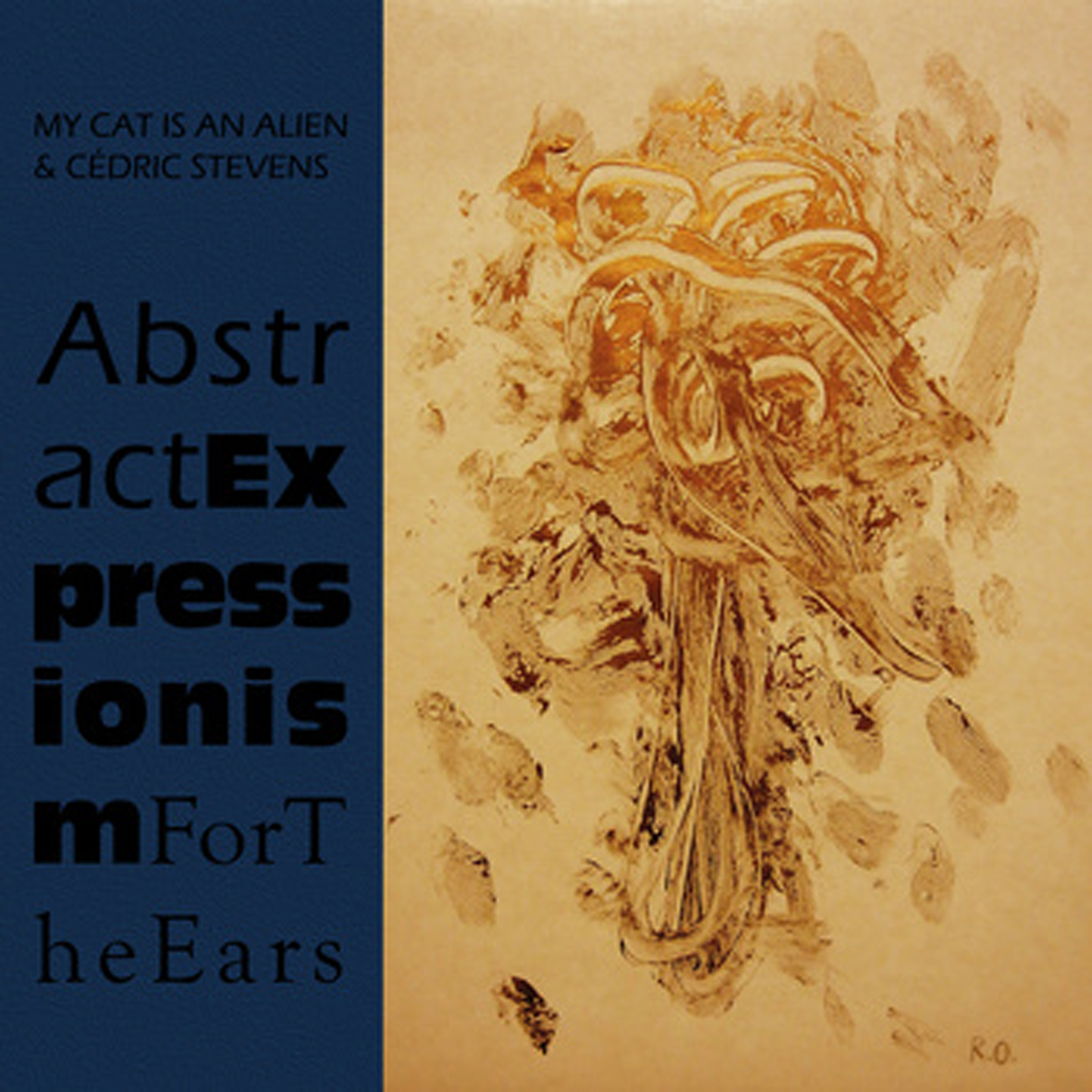My Cat Is An Alien & Cédric Stevens, "Abstract Expressionism for the Ears"
 No one will ever accuse the Opalio brothers of lacking ambition.  Their previous release, 2013's Psycho-System, was a hallucinatory drone epic that spanned six discs and clocked in at over three hours.  Now they are back with a triple-album in a very different vein.  Though similar in its staggering scope, Abstract Expressionism for the Ears is often considerably more accessible and organic-sounding than its more insular and deeply warped predecessor.  Part of that credit certainly goes to Stevens, who proves himself to be a very sympathetic collaborator, but the primary difference is the focus on unconventionally employed (and melodic) piano strings, which often makes Abstract Expressionism resemble classic Laraaji plunged into an otherworldly rabbit hole.  Most other times, of course, there is no earthbound point of reference to be found at all.
No one will ever accuse the Opalio brothers of lacking ambition.  Their previous release, 2013's Psycho-System, was a hallucinatory drone epic that spanned six discs and clocked in at over three hours.  Now they are back with a triple-album in a very different vein.  Though similar in its staggering scope, Abstract Expressionism for the Ears is often considerably more accessible and organic-sounding than its more insular and deeply warped predecessor.  Part of that credit certainly goes to Stevens, who proves himself to be a very sympathetic collaborator, but the primary difference is the focus on unconventionally employed (and melodic) piano strings, which often makes Abstract Expressionism resemble classic Laraaji plunged into an otherworldly rabbit hole.  Most other times, of course, there is no earthbound point of reference to be found at all.
The unpredictable tug-of-war between genius, excess, and impenetrability is one of MCIAA's most endearing traits: they might make some of the most brilliantly strange and beautiful music around, yet they always do it on their own terms, and those terms can be somewhat prickly.  Abstract Expressionism is a perfect example of that phenomenon, as it could have easily been a near-perfect single album made up of just "Tasting the New Ether" and "When the Sun Goes Down There is Nothing Left to Tune."  Instead, the Opalios opted to expand their triumph into a complex and challenging tour de force three times as long.  Whether that was a good idea or not is difficult to say.  On the one hand, it spreads the trio's best moments a bit thinner than would be ideal, but it compensates by turning Abstract Expressionism into an event rather than a mere album and lures listeners into some darker, stranger waters that that they might not have normally entered.
In any case, the opening "Tasting the New Ether" easily stands as one of the finest moments in the Opalio’s entire discography.  Built upon a gently rippling motif presumably played on Roberto's vertical piano, it weaves a dreamy, hallucinatory spell that is gradually threatened by stumbling, overlapping notes and an arsenal of chirps, snarls, and swells from Maurizio and Cédric.  I could have easily listened to "Ether" endlessly ebb and flow around its simmering miasma of feedback for another hour and it would have been great.  Instead, however, the piece gradually collapses into a black hole and it is gloriously heavy and wonderful.  "When the Sun Goes Down There’s Nothing Left to Tune" performs a similarly impressive balancing act between stuttering piano loops, rattling strings, and an increasingly roiling swell of abstract noise and electronics.  It succeeds just as beautifully.
The remaining two epic pieces, however, differ considerably.My pick of the two is "Intersection of Shadows," which sounds like a howling, gnarled transmission from deep space that eventually dissolves into a bizarre soup of flanging noise and something that resembles the garbled, digitized sounds of an alien rainforest. The 25-minute "Shifting at Zero Gravity," on the other hand, is a floating oasis of languorous calm, gently rattling strings, and echoing electronic chirps.  Gradually, however, it begins to evoke the cold enormity of space as Roberto's wordless vocals create an eerie, subtly dissonant undercurrent and the intruding rumbles, hisses, and distant howls become increasingly hard to ignore.
The album winds down with two comparatively shorter pieces, the 15-minute "The Ineffable Call of Tomorrow" and the 4-minute "Just a Tone of White Over Blue."  "The Ineffable Call" retains the mood of drifting interstellar isolation mingled with menace, but revisits the theme in a more grindingly metallic fashion that elsewhere.  "Tone" closes the album with a brief coda-like return to the zither-esque piano strings from earlier, but embeds them in a hallucinatory mélange of reversed noises and blearily dissonant wordless vocals.  While neither piece is a reasonable contender for an album highlight, both are strong enough to avoid seeming like filler and provide a welcome gradual transition back to normal conscious after such a prolonged and deep break with reality.
 



